Keeping your construction crew on schedule takes more than sticky notes and spreadsheets. Between shifting job sites, no-show subs, and overlapping trades, it doesn’t take much for things to fall behind. One missed update, and you're scrambling to cover a shift or chasing down progress reports.
That’s where construction crew scheduling software comes in—helping you manage where your teams are, what they’re working on, and who’s available. If you’re coordinating multiple jobs, trades, and timelines, tools that support construction field service management give you the visibility and control to keep things moving without the chaos.
Here’s what we’ll cover:
- Choosing the right construction crew scheduling software for your needs
- 5 key features to look for in a construction crew scheduling platform
- Best for commercial construction
- Best for residential construction
- Best for general contractors
- Other notable construction crew scheduling platforms
- 7 benefits of using construction crew scheduling software
- 4 important construction scheduling software FAQs answered
Let’s start by looking at what separates average platforms from the best crew management software—and how to find one that fits the way your crews actually work.
Choosing the right construction crew scheduling software for your needs
Managing a construction crew takes precision—especially when coordinating across job sites, trades, and subcontractors. Crew leads and field managers rely on construction crew scheduling software to avoid missed shifts, overlapping labor, and downtime that cuts into project margins.
But the tool you use can either keep your schedule tight or leave your crew guessing. Choosing a system built for construction crews means evaluating how well it works in real jobsite conditions—under pressure, with shifting demands, and across multiple teams.
Let’s walk through the top factors to consider when looking at construction crew management software—and what questions will help guide your decision.
- Cost – How does the software charge—per project, per user, or based on features? Do monthly vs. annual plans change the total cost? Is there a trial to test real workflows with your team?
- Complexity – Will your foremen and supers understand the interface without long training hours? How long does onboarding usually take for similar-sized teams? How fast can your crew start using it in the field?
- Support – What kind of help can you expect from the provider if something breaks during a project? Do they offer support that speaks the language of construction? Can they help tailor the platform to match how your crew works?
- Fit for your projects – Does the software work better for quick-turn subs or multi-month general builds? Is it designed for single-discipline work like concrete or steel, or can it handle mixed-trade projects? Does it scale across small jobs and complex builds?
- Features – Can it assign crews based on skills, certifications, or past job performance? Does it support shift planning by crew, not just individual techs? Can your field leads move things around quickly when timelines shift?
If you’re looking for software that fits how your crews actually operate—on-site, in motion, and under real deadlines—these are the questions that help cut through the noise. Construction teams don’t need generic features. They need tools that work in dirt, dust, and tight schedules.
5 key features to look for in a construction crew scheduling platform
Coordinating labor on a construction site is never as simple as dragging names on a calendar. Between trade stacking, site constraints, material delays, and safety regulations, your schedule needs to flex without falling apart. That’s why the best construction crew scheduling software offers tools that support the way contractors actually build—across trades, timelines, and shifting conditions. Below are five core features that help teams stay on track, day in and day out.
1. Real-time dispatching for field labor
Dispatching crews in real time is critical when plans shift on active sites. A crew can’t wait for paperwork or callbacks when a slab pour moves up or a framing crew gets delayed. The best platforms include integrated construction dispatch software that lets project managers and schedulers reassign labor, coordinate site access, and confirm task updates instantly.
Let’s say an earthwork team wraps site grading ahead of schedule. Your ops lead can immediately reassign them to a foundation prep job where work is falling behind—without disrupting any other active assignments. That kind of flexibility prevents costly downtime and keeps labor aligned with actual progress.
2. Mobile access for foremen and crew leads
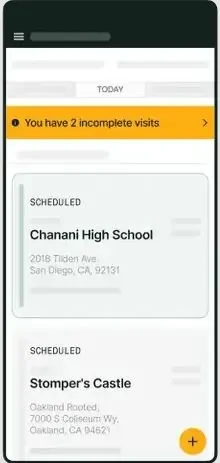
Crews in the field need access to shift details, task changes, and location info without stepping away from the job. A platform that includes a technician mobile app keeps everyone synced—whether they’re inside a mechanical room or three stories up on scaffolding.
Picture a plumbing crew arriving onsite only to find the general’s crew hasn’t cleared the slab. Instead of calling in and waiting, the foreman checks the app, reviews job updates, and redirects the team to their next scheduled task—saving a wasted trip and keeping productivity high.
3. Connected time tracking for crews by project
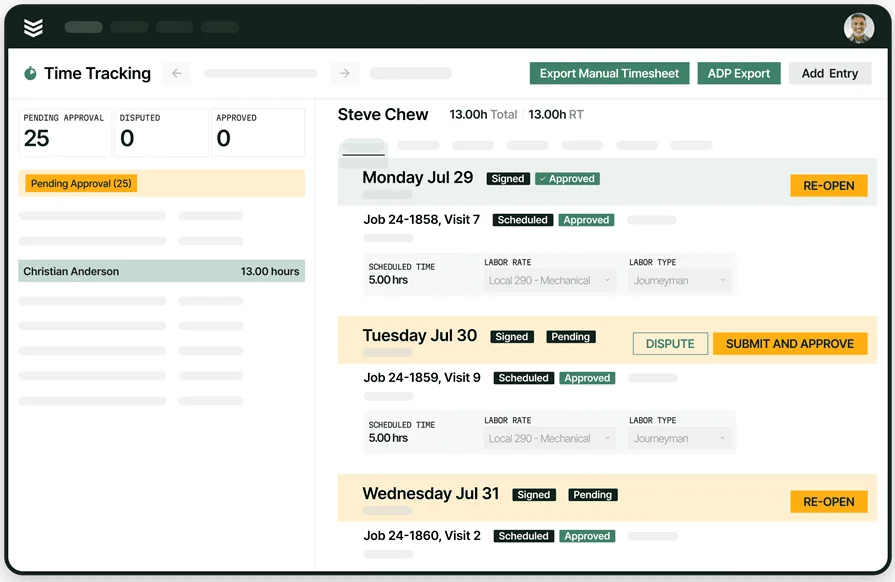
Construction scheduling isn’t complete without accurate labor tracking. Built-in time tracking helps verify when crews clock in, how long they stay on each task, and whether adjustments are needed across overlapping jobs. It also supports union compliance and ties directly into payroll and job costing.
Consider a case where your HVAC rough-in team is split across three school projects. By logging time by project phase and location, your office can track productivity, confirm billing, and spot sites where hours are consistently higher than estimated. That insight lets you adjust manpower before problems snowball.
4. Visibility into fleet and equipment availability
A well-scheduled crew still can’t start if the lift or skid steer isn’t on-site. That’s why construction crew management software needs real-time fleet management tools that track who has which equipment and where it’s located. Without it, you risk crews standing around waiting for gear that never shows.
For example, your structural crew is scheduled for steel erection Monday morning, but the crane they need is still across town finishing another job. A quick check of the fleet dashboard lets dispatch reroute the crane overnight, avoiding delays and keeping the day’s plan intact.
5. Reporting tools for schedule forecasting
Beyond day-to-day shifts, construction teams need visibility into how crew availability aligns with upcoming phases. Built-in reporting gives schedulers a forward look at labor demand, helping to prevent double-booking or under-resourcing on critical path items.
Let’s say you’ve got overlapping tilt-up pours and electrical rough-ins scheduled for the same week. Reporting data shows your carpentry crew is already allocated, giving you time to adjust timelines or pull in temp labor before site supervisors call in a panic. That foresight turns reactive chaos into planned execution.
Other valuable scheduling features construction crews watch for
While real-time dispatch, mobile tools, and time tracking carry most of the weight in construction crew scheduling software, there are other features that support field coordination, billing accuracy, and project forecasting. These tools may not drive the daily crew schedule, but they help keep the rest of your operation tight behind the scenes.
- Service agreement tracking – Platforms that include service agreement tools make it easier to manage long-term maintenance contracts or recurring crew schedules for specific clients. This helps contractors who handle multi-phase commercial work or ongoing service calls stay on top of labor allocation without manual tracking.
- CRM integration for workforce planning – Having a construction CRM tied to your scheduling platform allows your team to view upcoming projects, sales opportunities, and labor needs in one place. This improves forecasting by letting operations staff plan crew schedules based on expected pipeline activity.
- Invoicing and payments – A tight connection between your schedule and billing system—through invoicing and payments software—ensures that completed tasks, logged hours, and scope changes are reflected in your customer billing without chasing paperwork. It speeds up cash flow and cuts down on disputes by tying labor activity directly to job documentation.
These supporting features round out a strong construction crew management software stack. While they don’t directly handle daily scheduling, they create smoother handoffs between fieldwork, project planning, and billing. With these tools in place, your crew stays focused on building—while the back office keeps everything aligned behind the scenes.
Best for commercial construction: BuildOps
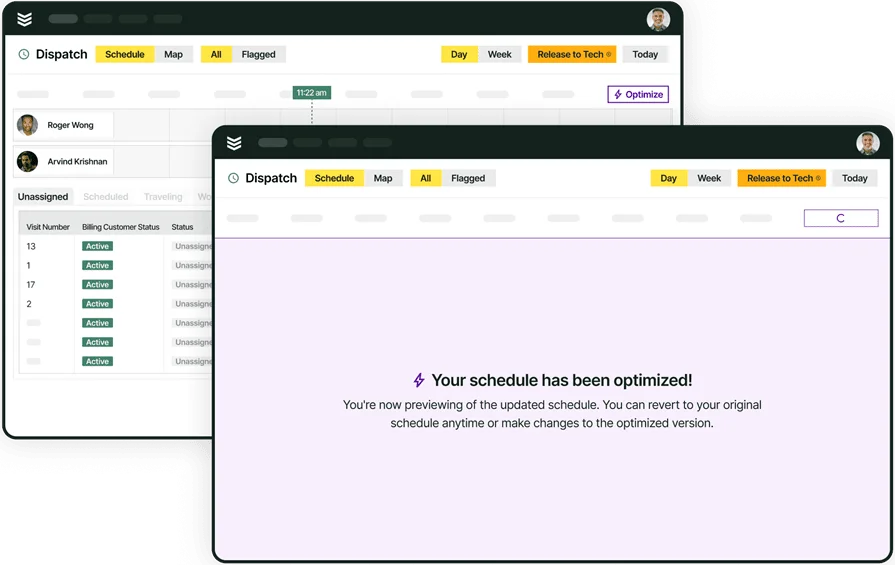
BuildOps is specifically built for commercial contractors that rely on field teams to hit tight deadlines and complex scopes. Its construction crew scheduling software uses a drag-and-drop calendar, multi-site dispatch, and trade-level filtering so schedulers can deploy teams based on skillset, certification, and location.
Commercial subs especially benefit from crew templates, which simplify repeating shift blocks across similar project phases. Field and office teams stay aligned through real-time updates and audit trails, making BuildOps a strong match for high-volume service contractors and tenant improvement specialists.
How pricing works: Annual per-user contract.
Features beyond scheduling: Real-time dispatching, AI-assisted job notes, search by crew attributes, invoicing, service agreements.
What sets it apart: Built specifically for commercial trades, with tools that support crew scheduling across multi-job operations, recurring contracts, and regional service teams.
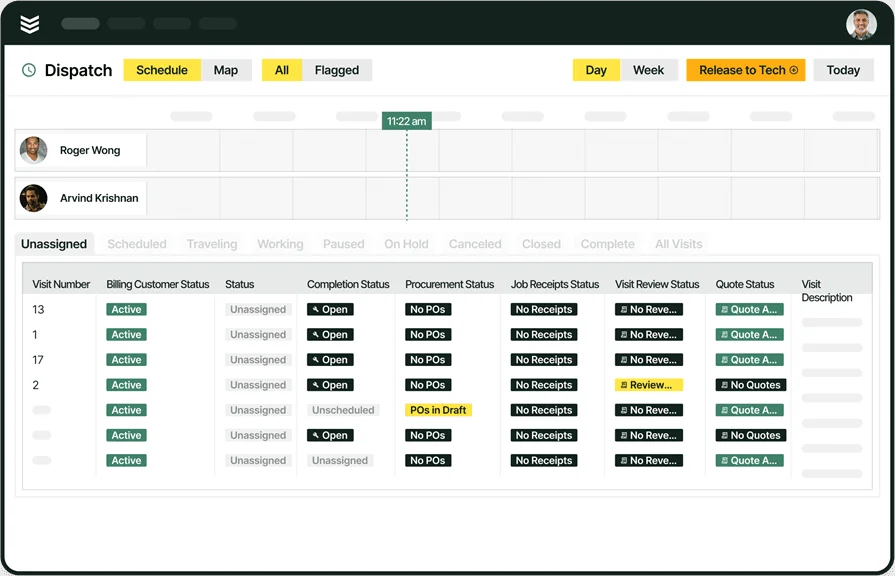
Get full jobsite visibility
We help commercial crews schedule projects and manage jobs more effectively.
Best for residential construction: Pro Crew Schedule
Pro Crew Schedule supports smaller teams working residential jobs where same-day changes, limited crews, and lean resources are common. It offers calendar views, crew assignment dashboards, and mobile task checklists to help trades like HVAC, electrical, and remodeling teams stay coordinated with minimal overhead. The tool fits contractors doing multiple jobs per week who need a clean way to assign and track basic job data. That said, it may not scale easily for high-volume firms or those managing multiple concurrent commercial builds.
How pricing works: Monthly subscription based on user count.
Features beyond scheduling: Mobile daily logs, progress tracking, visual task assignments.
What sets it apart: Lightweight and easy to use for solo contractors or small teams focused on home remodels, service calls, or one-off installations.
Best for general contractors: Procore
Procore offers a deep platform that includes project management, submittals, RFI tracking, and crew scheduling tied into broader project timelines. Its project scheduling tool allows GCs to assign teams, track milestones, and manage subcontractor timelines inside a single interface. Large general contractors benefit from its integrations, reporting dashboards, and ability to align labor plans with field status reports. However, the full platform may be more than what a specialty trade contractor or midsized operation needs day to day.
How pricing works: Custom quotes based on company size and module use.
Features beyond scheduling: Full project lifecycle tracking, document control, field reporting, and financials.
What sets it apart: Best for GCs overseeing large projects with multiple subs and strict owner requirements.
Other notable construction crew scheduling platforms
Some contractors don’t need a full-scale platform to stay organized—they just want a practical way to assign crews, manage shift coverage, and communicate changes fast. These tools are built for smaller operations or task-specific teams that want a lightweight system to keep daily work moving. While they may not include advanced dispatch or forecasting features, they’re still useful for keeping boots on the ground aligned with the schedule.
Fieldwire
Fieldwire blends jobsite task tracking with simple calendar scheduling. It allows field leaders to assign tasks, log progress, and manage punch lists directly from the jobsite. Crews can access drawings, comments, and job updates in real time, making it a solid fit for subcontractors and self-perform teams. However, Fieldwire may lack the crew-specific scheduling tools needed to manage labor across multiple sites or trades.
How pricing works: Tiered monthly subscription per user.
Features beyond scheduling: Punch list tracking, blueprint markups, mobile task communication.
What sets it apart: A strong visual interface that connects task updates to on-site construction documents.
Sling
Sling is a shift scheduler that helps construction teams organize labor by role, availability, and location. It works well for basic time slot planning and allows teams to handle shift swaps, track time off, and send alerts through one interface. Sling keeps scheduling simple and focused on day-to-day crew assignments. Still, it may fall short for contractors managing phased projects or more technical trade coordination.
How pricing works: Free tier available; paid plans unlock advanced scheduling and reporting.
Features beyond scheduling: Time-off management, labor cost tracking, mobile schedule alerts.
What sets it apart: Ideal for small crews needing straightforward shift management without extra features.
Teamup
Teamup is a color-coded calendar tool that gives small contractors a visual way to schedule crews, view availability, and manage rotating jobs. It supports user permissions by role and displays multiple projects or crew calendars in one place. It’s easy to use and helps teams avoid overlapping assignments. That said, it offers limited tools for tracking job progress or managing workforce at scale.
How pricing works: Free for basic use; paid tiers based on number of users and calendar features.
Features beyond scheduling: Role-specific calendar access, customized views, simple mobile access.
What sets it apart: A flexible calendar tool for assigning crews and viewing jobsite activity at a glance.
ScheduleBase
ScheduleBase focuses on weekly crew assignments and mobile alerts for job updates. It allows contractors to create and distribute shift schedules quickly, with automatic notifications sent to the field. Designed for repetitive shift work, it’s a good match for maintenance and support teams. Still, it lacks job tracking, equipment visibility, or features for project-based labor planning.
How pricing works: Subscription based on number of active scheduled employees.
Features beyond scheduling: Shift templates, availability tracking, automated notifications.
What sets it apart: A clean and fast option for recurring crew scheduling and communication.

Easily compare software tools
Make sure you’re getting the system that will help your team level up your game.
7 benefits of using construction crew scheduling software
For contractors managing tight schedules and high labor demands, construction crew scheduling software delivers more than just a calendar. It drives efficiency, cuts waste, and keeps field teams aligned with real job progress. Whether you’re running multiple jobs or coordinating trade-specific teams across a single site, these tools help crews execute faster and with fewer setbacks. Here are seven key benefits that matter to your day-to-day operations.
1. Fewer scheduling conflicts across projects
With real-time visibility into crew availability, schedulers can avoid double-booking labor across overlapping sites. When a project shifts due to weather or delays, it's easier to reassign crews without causing chaos. This kind of coordination is a core part of any construction crew scheduling platform built for active field use—not just office planning.
2. Clearer field reporting and job tracking
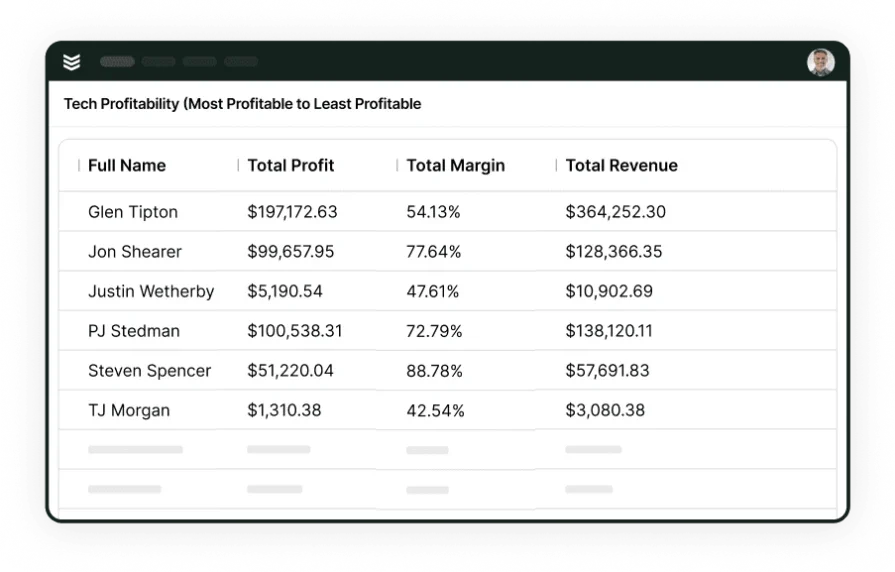
By syncing your schedule with field updates, project managers can see who showed up, what got done, and what needs to shift tomorrow. Platforms with integrated reporting make this easy by tying scheduled tasks to daily crew logs, helping validate labor hours and track production. Contractors using construction field report apps benefit from faster communication between foremen and office staff, keeping job data up to date without the paperwork lag.
3. Faster turnaround on work orders and job changes
When work scope changes mid-job, schedulers can instantly reassign crews and push updated tasks to the field—without waiting for calls or back-and-forth emails. A strong construction crew management software solution supports flexible workflows that adapt to daily change without delaying progress.
4. Better control over labor costs
Time tracking connected to scheduling helps eliminate underbilling or missed hours. You get better labor forecasting, more accurate estimates on crew output, and cleaner payroll data across projects. The result is tighter control over project margins and clearer reporting for field performance.
5. Easier job forecasting and resource planning
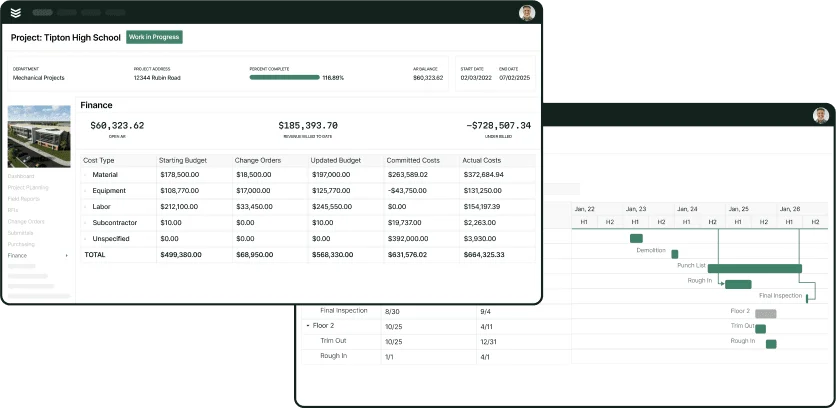
Seeing labor needs in advance makes it easier to balance workloads across upcoming jobs. With access to pipeline visibility, schedulers can match crew availability to upcoming phases or identify when outside labor is needed. Tools built with construction contractor CRM features help teams plan based on real sales data and job commitments—linking labor planning to future work.
6. Unified view of crew operations across the field and office
Whether it’s the foreman assigning the next day’s tasks or the back office reviewing job hours, a single scheduling platform creates a shared source of truth. Tools that support both field visibility and back-end workflows fall under broader construction field service management software systems—giving contractors a full view of operations, not just task lists.
7. Improved communication and accountability on every job
Crews know where they’re expected, what needs to be done, and who’s working with them. That reduces call-ins, late starts, and missed steps. It also strengthens accountability, since schedule logs and job status updates are easy to review later if something goes off track. For busy contractors, clear crew coordination reduces risk, rework, and delays before they snowball.
4 important construction scheduling software FAQs answered
Whether you're a project manager, foreman, or operations lead, the construction crew scheduling software you choose impacts how efficiently your crews get to work—and stay on track. With so many platforms offering different features, pricing models, and levels of complexity, it's easy to get stuck sorting through options. These four common questions help clarify what to expect and what matters when choosing software built for construction teams.
1. What is construction crew scheduling software?
Construction crew scheduling software helps assign, adjust, and manage labor across one or multiple job sites. It gives you a clear view of which teams are available, what tasks are scheduled, and how shifts align with job phases or trade requirements. It gives contractors a faster turnaround when jobs change mid-day.
A strong scheduling tool also supports communication across field and office teams, integrating job updates, shift changes, and equipment needs in real time. This helps reduce downtime, prevent labor gaps, and ensure crews are always aligned with the project timeline.
2. How do construction scheduling programs work?
These programs offer a live view of where crews are assigned, how shifts overlap, and what job phases are active. Through drag-and-drop calendars, mobile updates, or automated dispatching, they allow you to move labor around in response to real-time job conditions.
Schedulers can filter by trade, certification, or availability and assign crews accordingly—then push updates straight to the field. This speeds up jobsite coordination and keeps your workforce aligned with project goals, especially when managing multiple locations.
3. How much does construction crew scheduling software cost?
Pricing can vary widely depending on how many users you have, what features you need, and how the software is delivered. Entry-level platforms may start around $30–$50 per user/month, while more advanced solutions with dispatching, reporting, and integrations can range from $100 to $300 or more per user/month.
Several factors influence cost:
- Number of crew members or admins using the platform
- Add-ons like mobile access, time tracking, or equipment management
- Level of support and onboarding provided by the vendor
- Billing model (monthly vs. annual commitments)
Make sure to evaluate whether pricing reflects tools you’ll use daily—not just a long list of features you’ll never touch.
4. What are best practices when using construction crew scheduling software?
To get the full value from your construction crew management software, it's important to treat it as a core part of how you plan and execute work—not just an admin tool. Here are ten best practices to help your crew and office staff get aligned:
- Keep schedules updated daily based on field conditions
- Use filters to assign crews by trade, certification, or job experience
- Integrate time tracking to validate hours and manage labor budgets
- Push schedule updates to field leads through mobile notifications
- Assign roles or permissions to avoid accidental edits by non-admins
- Review weekly performance reports tied to crew assignments
- Sync scheduling tools with payroll or invoicing to reduce admin load
- Map crew availability across all active and upcoming jobs
- Use tags or labels to flag priority tasks or short-handed shifts
- Document shift history for backup in case of disputes or delays
Following these steps helps your team maximize uptime, stay flexible when things shift, and ultimately finish jobs stronger and faster.

Get the Marketing Tools guide
Find out which marketing tools drive more appointments and service agreements.
Coordinating labor across job sites is never simple. From last-minute delays to shifting trade schedules, the only way to stay ahead is with a system that keeps everyone—from your field crews to your office staff—on the same page. The best construction crew scheduling software doesn’t just help you assign shifts. It helps you plan smarter, reduce rework, and move your team with confidence through every phase of a project.
For commercial contractors in particular, the stakes are higher. You’re managing multiple crews, juggling timelines, and making sure the work meets contract terms and client expectations. In those cases, using a standalone scheduler only solves part of the problem. What you need is a platform that connects scheduling with time tracking, job costing, dispatch, and field updates. That’s where a complete construction crew management software platform like BuildOps brings everything together—designed to support real-world commercial field service operations, start to finish.
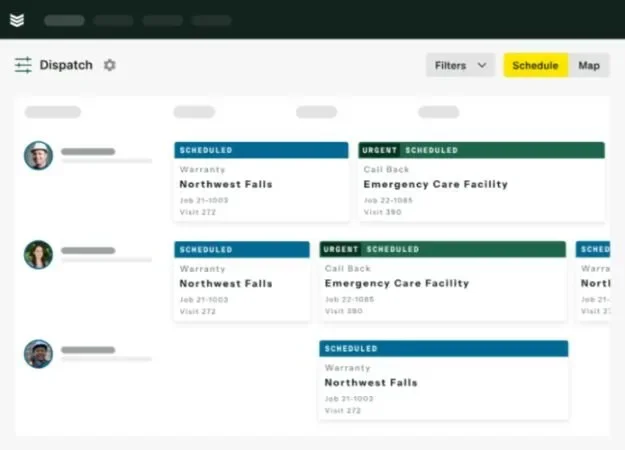
Give BuildOps a Try
We can help you schedule smarter, communicate faster, and keep jobs moving.







